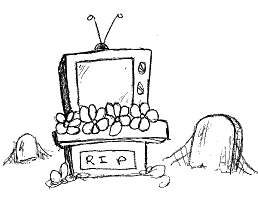![]()
![[ OPINIONS ]](/images/fall97/opinionsf97.gif)
![]()
By Jill Dellamalva
Arizona Daily Wildcat January 16, 1998
Addicted to grief
![[Picture]](04_3_i.gif)
Jill Dellamalva |
It is estimated that $10 million was spent on flowers for Princess Diana's
funeral. In addition, millions were also spent on Elton John's tribute song
to her, "Candle in the Wind '97."
I think that the current mass grieving began with the assassination of President John Kennedy and gained momentum with the assassination of his brother Robert. For some very good reasons, the public did not respond in the same way to the recent death of Michael Kennedy. Perhaps this was due to the fact that he was charged for having an affair with the 14-year-old family baby sitter. When he died from injuries received in a skiing accident, there was no communal bereavement. Instead we experienced a counter-reaction. We said that he was rebellious. He had been warned by the ski patrol not to play football on the slopes. We said he thought he was invincible.
A second celebrity skiing accident followed within a week. I was surprised at the extent of the public grief that followed Sonny Bono's death. This was classic mass grieving. His ex-wife, Cher, gave a tearful eulogy following those of California Gov. Pete Wilson and the Speaker of the House, Newt Gingrich.
If we who are members of this mass grieving society applied the same moral standards to Sonny and Cher as we did to Michael Kennedy, Rep. Bono, a California Republican, would have been buried with very little fanfare. However, that was not to be. The moral damage was mitigated by what Cher said during her eulogy - that she lied to Sonny Bono, telling him she was 18 rather than 16 years old when she begged the 27-year-old man to take her home with him.
We needed a fix and Sonny Bono was our man. The standards for who deserves this outpouring of emotion are often variable. Why should Princess Diana have met our standards? Didn't she admit to having an extra-marital affair?
It seems that a new death-related phenomenon has developed which is so difficult to explain, that I'm reluctant to begin the subject. Be here is an attempt.
We, the public, are addicted to mass grieving for people about whom we know very little. We attach ourselves to rich and famous celebrities while they are alive. We follow their every move, their marriages, their divorces. We are elated by their successes and saddened by their troubled failures.
What is most amazing is that most of us who are afflicted with this "celebrity disease" do not feel the need to grieve for people that we actually know.

Can you picture this little scenario? A teenage girl is watching her videotape of Princess Diana's funeral for the fourth time when he mother approaches her and says, "Dear, Aunt Ethel died, and I was hoping you could drive me to the church services." Instead of displaying even the slightest bit of grief, the teenager responds, "Mother, I can't take time off of my busy schedule to attend a service of someone I barely know."
Get the picture?
We expended all of our energy mourning Princess Diana and, lo and behold, when Mother Theresa died a week later we were drained. We had no sorrow left for the old, wrinkly woman who was only 4 feet 8 inches tall. She wasn't royalty; rather, she was from one of the poorest and most backward countries. She didn't wear designer clothes. Let's face it, Mother Theresa's timing was bad. We gave her mourning our best, but it lacked enthusiasm. We were fortunate because the masses of people in India filled in nicely for us.
Do you want to join the society of grief? There are no dues to be paid, no meeting dates, and no applications to be filled out. You need only to be selective in who you mourn and base it on what you think their contribution to society at large is.
Welcome to the club.
Jill Dellamalva is a junior majoring in creative writing and journalism.



